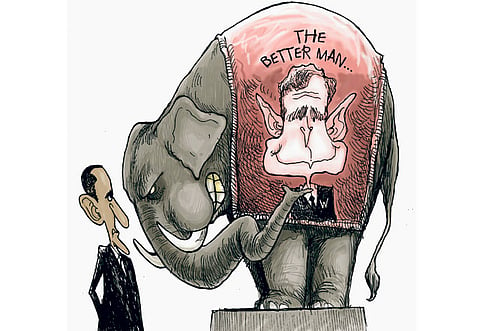Swagger isn't actually a policy
Obama is right to focus on identifying where the intelligence system failed and fixing the shortcomings

It is difficult to deny that parts of the US government did a far-from-thorough job when it came to detecting the Nigerian man who allegedly tried to blow up a Detroit-bound airliner on Christmas Day. The odd thing about watching the partisan reaction to the incident, however, has been the degree to which President Barack Obama's Republican critics have focused on style rather than substance.
The easy-going, slightly absurd, version of this can be seen in people like GOP Congressman Peter King. When asked by ABC News to name a "specific recommendation the president could implement right now" to improve America's security, King said:
"I think one main thing would be to — just himself, to use the word ‘terrorism' more often."
The harder-edged, bordering on hysterical, version comes, as always, from the world of talk radio where the foiling of the Christmas Day bombing has widely been seen as a retrospective justification for torture (sorry, "enhanced interrogation techniques") and indefinite detention at places like Guantanamo Bay.
Obama's reaction to the Christmas Day events was essentially to demand that the bureaucracy get its act together: stop engaging in finger-pointing, identify where the system failed and fix the shortcomings. While this is not as dramatic as vowing to hunt the terrorists to the ends of the earth, a strong case can be made that it might actually prove to be more effective in terms of keeping people from blowing up airplanes.
Still, Republicans have fastened onto the idea that Obama's abandonment of George W. Bush's swaggering attitude has, itself, created new areas of vulnerability for the American public. According to this theory, because Obama is not trying to intimidate the terrorists with his words and his body language they will be emboldened and will continue striking at America.
The Democrats' great failure throughout this period lies in their silence. Afraid of being called soft they have shied away from making the case that image is a key component of foreign policy and that the tough-guy approach of the previous administration probably created more problems than it solved.
Though unfortunate, this was predictable. Since the Second World War, America's political conventional wisdom has tended to see the Republicans as the party of strength in national security matters. Decades before Obama or Bush lived in the White House a cultural meme arose within which Republicans are presumed to be tough but Democrats are required to prove themselves.
The overheated world of talk radio and cable news has never had much time for public diplomacy, or what is sometimes known as "soft power". Yet soft power is exactly what Washington has long needed to take more seriously as a tool of statecraft. If there has been a single consistent theme to the Obama administration's first-year foreign policy it has been a concerted effort to undo the image of America as a self-absorbed, swaggering bully. This is immensely important work, but it was never going to be a short-term project.
Reputations can be damaged quickly, but take a very long time to rebuild. In America this work becomes even harder than it has to be because we have an unfortunate need for instant gratification.
Obama seems to understand this even if his critics — both at home and abroad — often don't. During his first year in office he has repeatedly been criticised at home for appearing to care what foreigners think of America, while in some overseas quarters the very gestures that so anger his domestic critics are dismissed as empty rhetoric.
High expectations
The truth of the matter is that many of Obama's admirers — domestic and international alike — projected unrealistically high expectations onto his presidency before it even began. The danger, at this stage, lies in letting disillusionment cloud one's judgment. Does anyone outside the most partisan of Republicans really believe that a lack of Bushian swagger equates to weakness and/or incompetence?
Obama's first year in office has been far from perfect. His second year will, doubtless, bring its share of disappointments as well. But any real, long-term assessment must wait.
In the meantime, those who liked Bush's heavy-handed approach to both domestic and foreign affairs are disappointed in Obama now and are not likely to change their opinion. Those observers — both at home and abroad — who yearned for something different should consider the broader picture before writing off this still-young presidency.
Gordon Robison, a writer and commentator who has lived in and reported on the Middle East for two decades, teaches political science at the University of Vermont.



